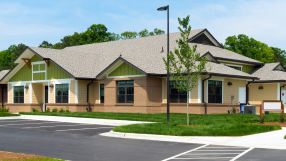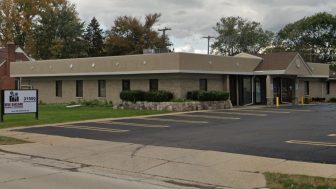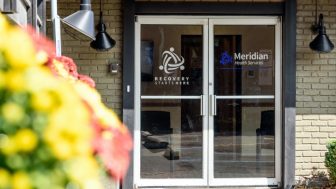Cherry Health Community Treatment Center
8333 Townsend Street
Detroit, MI 48213
Detroit, Michigan
313-579-5824
Get Help Now - 313-572-0595
 Who Answers?
Who Answers?

Amenities

Private Rehab
Private drug rehab provides a comfortable, secure environment that allows you to focus on doing the work to ge...t your life back on track. Benefits include a higher staff-to-client ratio, increased one-on-one time with therapists and healthcare providers, private rooms for clients, and customized forms of therapy.Read More

Residential Setting
Residential drug rehab provides the comforts of home with the therapeutic support needed to successfully recov...er. Benefits of an inpatient program include increased safety, a higher success rate, and the time and distance given to focus on recovery. Residential drug rehabs are often the preferred method of treatment, as they can be tailored to meet specific needs, offer focused therapeutic care, and provide the necessary tools to sustain recovery.Read More
Addiction Treatment Programs
Adult Program
Alcoholism
Cognitive Behavioral Therapy (CBT)
Men's Rehab
Rehab For Veterans
Opioid Treatment
Senior Drug & Alcohol Rehab
Women's Rehab
Teen & Adolescent Program
Adult Program
No single adult program in Michigan is right for everyone. That’s why each program is tailored to meet the needs of the individual. Common aspects to an adult rehab program include individual counseling, group therapy, and aftercare support.Alcoholism
The backbone of most alcohol rehab in Michigan is a combination of individual and group therapy methods. Through these sessions, individuals learn how to address issues contributing to addiction and develop healthy lifestyle habits.Cognitive Behavioral Therapy (CBT)
During cognitive behavioral therapy in Michigan, participants do more than talk with their therapists. This is an engaging, hands-on approach that requires active participation. Individuals work with their therapist to change their thought and behavior patterns to overcome addiction.Men's Rehab
During men’s rehab in Michigan, individuals spend a significant amount of time in therapy. This gender-specific treatment gives men the tools they need to cope with stress and live without drugs and alcohol.Rehab For Veterans
Veteran’s rehab in Michigan is often staffed by Veterans who understand the experiences of program participants. Services are tailored to meet Veterans’ needs with focused individual and group therapy as well as nutritional education, family therapy, recreational therapy, and other interventions.Opioid Treatment
Each opioid rehab in Michigan is unique, but most consist of several key steps: admission, detox, addiction therapy, specialized care, and aftercare. Professional staff evaluate each person’s needs to recommend treatment duration and specific therapies.Senior Drug & Alcohol Rehab
Age-specific rehab can put participants at ease because they are with their peers. Elderly rehab in Michigan provides a safe and inviting setting for seniors to get the help they need to overcome addiction.Women's Rehab
Women’s rehab in Michigan offers a full continuum of care for women seeking treatment for addiction. Programs range from intensive inpatient care to aftercare services.Teen & Adolescent Program
A young adult program in Michigan specializes in treatment tailored to individuals in this stage of life who are suffering from substance use disorder. Treatment addresses addiction and the challenges related to young-adult life.Levels of Care
1
Inpatient Rehab
Inpatient drug rehab in Michigan offers multiple forms of evidence-based treatments and complementary therapie...s you must particiapte in while living at the facility. Some inpatient rehabs offer nutritional counseling, recreational therapy opportunities, and meditation classes.Read More
2
Outpatient Rehab
Outpatient rehab in Michigan is tailored to each person’s recovery journey. This treatment usually involves ...several hours of therapy sessions each week, along with attendance at support group meetings. However, the timeline varies from a few weeks, to months, to years, based on your needs.Read More
3
Aftercare & Alumni Program
Aftercare rehab in Michigan helps you overcome hurdles after completing an addiction treatment program. You ca...n receive assistance with finding a job, navigating legal issues, getting education, or plugging into a support group. These aftercare services unlock resources to help you continue to live a sober life.Read More
4
Dual Diagnosis & Mental Health
A dual diagnosis treatment center in Michigan allows you to get treatment for substance abuse and mental healt...h disorders at the same time. This is critical, because untreated mental health disorders often lead to relapse and poor recovery outcomes.Read More
Accreditations

CARF
Insurance
 Financial Aid
Financial Aid
If you're a Michigan resident in need of financial assistance with rehab, Financial Aid may be an option. This... can help you access all levels of care, including detox, inpatient rehab, and more. Types of financial assistance options include grants, scholarships, non-profit programs, personal funding, and health insurance programs to help you manage the expense of substance abuse treatment.Read More
 Medicaid Accepted
Medicaid Accepted
You may be eligible for Medicaid, which can help with the cost of alcohol and drug rehab in Michigan. Covering... all levels of care, Medical Assistance can make detox, inpatient and outpatient rehab, and other forms of addiction affordable.Read More
 Medicare Accepted
Medicare Accepted
You may be eligible for Michigan Medicare, which could cover the cost of alcohol and drug rehab in Michigan. T...he amount of coverage will depend on many things, including whether you are seeking inpatient or outpatient treatment for substance abuse.Read More
 TRICARE
TRICARE
Administered by the Department of Defense, TRICARE offers comprehensive military health insurance plans for ac...tive and retired military members and their families. Similar to PPO programs offered by private insurance companies, TRICARE covers multiple levels of care for addiction treatment, including detox, inpatient rehab, and outpatient services.Read More
 Private Insurance
Private Insurance
If you have private insurance, you may be able to use your coverage to help cover the cost of alcohol and drug... rehab in Michigan. Your rehab insurance policy may cover a poirtion of treatment or it may cover 100% of your treatment costs..Check with your insurer for more information.Read More
 Self-Pay Options
Self-Pay Options
In Michigan, you have the option to pay for your drug or alcohol addiction treatment through self-pay options,... also known as private pay. This allows you to manage the cost of your recovery journey. All levels of care, including detox, inpatient rehab, and more, are available to you through this option without limitations of insurers or state-run programs.Read More
Contact Cherry Health Community Treatment Center

Location Details
Other Nearby Facilities

New Oakland Family Centers Livonia Center
31500 Schoolcraft
Livonia, MI 48154

Meridian Health Services Waterford
1435 North Oakland Boulevard Suite 100
Waterford, MI 48327

Sacred Heart Rehabilitation Center
400 Stoddard Road
Richmond, MI 48062

John D Dingell VA Medical Center Pontiac VA Clinic
44200 Woodward Avenue Suite 208
Pontiac, MI 48341